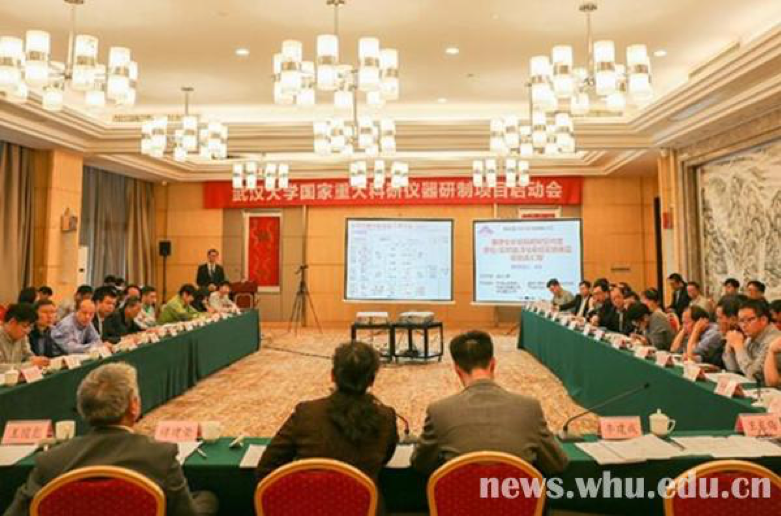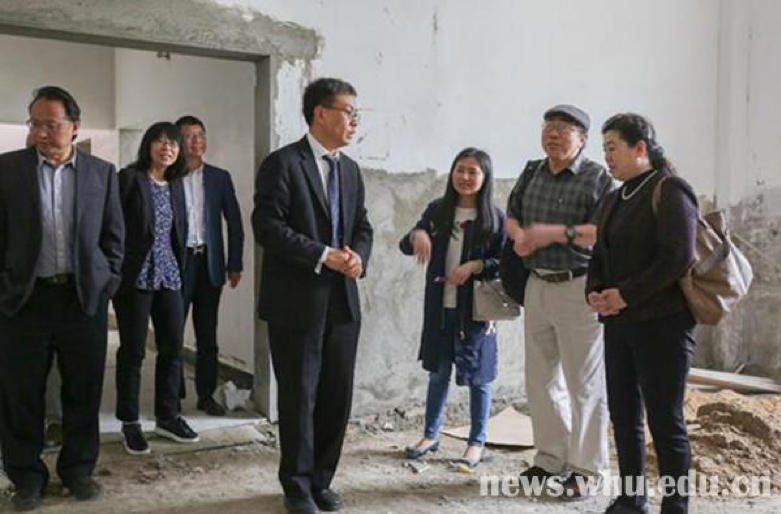WHU has seen, in Wuhan, China, the official launch of its first national development project of major scientific research instrument, namely the time and space-crossing in situ / real-time monitoring and regulating instrument for film growth defects. The project will be conducive to world-class film growth study in China and leapfrog development for China’s advanced equipment.
It is the only major instrument development project endorsed by the Ministry of Education in 2017 and also the first of its kind to be approved among the higher institutions in Central China. Receiving a direct fund of 65 million RMB, the project is supported by WHU, with Prof. Liu Sheng, the Dean of School of Power and Mechanical Engineering at its core, and partnered by the Institute of Semiconductors of CAS, the Tianjin Research Institute for Advanced Equipment of Tsinghua University, the Institute of Microelectronics of CAS, Huazhong University of Science and Technology, and South China University of Technology.

The joint meeting of the Management and Supervision Team and
the Project Initiation Event
At the joint meeting of the Management and Supervision Team and the Project Launch Event, Vice President of WHU Li Jiancheng expressed sincere gratitude to the National Natural Science Foundation of China, the Ministry of Education, the experts of the Project Assessment Team and the Supervision Team, as well as the R&D personnel from cooperative institutions for their strong support for WHU. And he hoped that WHU and other participants would cooperate in a sincere manner and complete the project in high quality and quantity. At the same time, he said that WHU would shoulder its responsibility in finding experimental sites, introducing and fostering high-quality professionals, recruiting more graduate students and allocating more funds to facilitate the implementation of the project.
Gao Ruiping, Deputy Director of the National Natural Science Foundation of China, put forward three requirements: first, this is a pioneering project in universities of central China, so the team should develop innovative instruments on the basis of solving specific scientific research problems and making breakthroughs; second, the expert group ought to make it a good start by putting forward good suggestions and taking the responsibility for the country and the project as well; and third, the Supervision Team should take its due responsibility and give full play to the role of guidance and correction, promoting the formation of original results.
Zhou Min, Deputy Director of the Basic Research Office of Department of Science and Technology, the Ministry of Education, proposed three expectations: to strengthen the responsibilities of the leading university; to emphasize the industrialization of research results; and to fully exert the influence of the Supervision Team.
Wang Guobiao, Vice Director of Engineering and Materials Science Department presided over the project presentation, expert evaluation, inquiry, and field research. Also, he demonstrated the assessment objectives, difficulties of the implementation, and technical routes requirements.
Liu Sheng introduced the progress of the project and the 2018 plan. He gave a speech about the content of the project and the research route from six aspects, namely instruments and scientific objectives, working foundation of instrument development, working conditions, specific implementation plan and development progress, project management mechanism and risk analysis, and project results and the test methods.
The experts from the Assessment Team and the Supervision Team fully praised the technical route and implementation plan of the project and put forward many suggestions as guidance. Academician Tan Jianrong, the leader of the Supervision Team, also provided opinions on the supervision work, hoping that the Ministry of Education would give some support so that the Team could fully play its role of supervision and guidance.
The Assessment and Supervision Teams also visited the “Advanced Manufacturing and AI Laboratory of WHU” under construction, including the Electron Microscopy Laboratory and the Purification Laboratory. They were optimistic about the laboratory's construction planning, external environment, safety, and technical support conditions.

The Assessment and Supervision Teams visiting the laboratory
After discussion and on-site research, the Assessment and Supervision Teams agreed that the project has a clear goal, a reasonable overall design plan, and a feasible five-year development plan; the annual work plan is specific and meticulous, the management measures for organization and implementation are reliable; and academic support conditions and advanced public scientific research facilities provide a sound working platform for the implementation. As a result, both the Assessment and Supervision Teams agreed to start the instrument development at an early date.
It is said that film growth represents the direction of advanced manufacturing. Its defect mechanism, spanning from meso- and macroscopic level and from femtosecond to second, however, still leaves rooms for further exploration. At present, the measurement of the film growth is mostly limited to macroscopic one, and the microscopic measurement cannot be traced at a time-space level, thus lacking effective analysis, feedback, and regulation for microscopic mechanism of defect formation. The time and space-crossing in situ / real-time monitoring and regulating instrument for film growth proposed by the project will not only direct the country to the world's leading level in this field, but will also greatly promote the multidisciplinary development such as physics, chemistry and biology.
The approval of the project has also further consolidated Wuhan University’s comprehensive scientific research capabilities as a comprehensive university, laying a solid foundation, in the new era, for the development of double first-class engineering research and teaching.
(Author: Ding Xing. Rewritten by Li Xin. Edited by Zheng Lingling, Shen Yuxi, Liu Jiachen and Liu Xiaoli)
